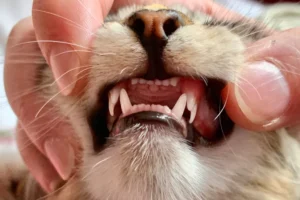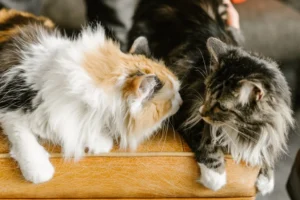Cats are often known for their independent nature and aloof demeanor, but when it comes to their health, it’s important for pet owners to pay attention to potential issues like gum disease. Why do cats get gum disease? Let’s explore the reasons behind this common dental problem in our feline friends.
Cats, like humans, can develop gum disease due to a variety of factors. From poor dental hygiene to underlying health issues, there are several reasons why cats may suffer from gum disease. Understanding the causes can help pet owners take proactive steps to prevent and treat this condition in their beloved companions.
Importance of Dental Care for Cats
Proper dental care for your cat is essential to prevent gum disease and maintain their overall health. Regular brushing of your cat’s teeth with cat-friendly toothpaste can help remove plaque and prevent tartar buildup, reducing the risk of gum disease. Additionally, annual dental check-ups with your veterinarian can catch any dental issues early on before they progress into more serious problems. Neglecting your cat’s dental care can lead to painful gum disease, tooth loss, and even more severe health issues. Taking care of your cat’s teeth is just as important as any other aspect of their health routine.
Signs and Symptoms of Gum Disease in Cats
Being aware of the signs and symptoms of gum disease in cats can help you detect and address any issues promptly. Bad breath, red or swollen gums, drooling, difficulty eating, and loose teeth are all common indicators of gum disease in cats. If you notice any of these symptoms in your furry friend, it’s crucial to schedule a visit to the veterinarian for a thorough dental examination. Paying attention to your cat’s oral health and seeking professional advice when needed can help prevent gum disease from progressing and causing further discomfort to your pet.
Additional Unique Insight : One often overlooked sign of gum disease in cats is a change in their behavior. If your cat suddenly becomes more irritable, avoids chewing on toys or hard food, or seems reluctant to be touched around the mouth, it could be a sign of oral pain related to gum disease. Be observant of any changes in your cat’s behavior, as these subtle cues can also indicate dental issues that require attention.
Remember, early detection and proactive care are key to keeping your cat’s teeth and gums healthy. By staying alert to potential signs of gum disease and taking action to address them, you can help your feline companion maintain a bright smile and overall well-being.
Risk Factors for Gum Disease in Cats
Cats, like humans, can also suffer from gum disease. Several factors can increase a cat’s risk of developing this condition, including poor dental hygiene and lack of dental care. Other risk factors include age – older cats are more prone to gum disease, diet – a diet high in carbohydrates can contribute to plaque buildup, and genetics – some cat breeds are more susceptible to dental issues.
Additionally, smoking households can expose cats to harmful chemicals that can affect their oral health. Medical conditions such as diabetes or feline leukemia can also make cats more vulnerable to gum disease. Regular veterinary check-ups, proper dental care, and a balanced diet can help reduce the risk of gum disease in cats.
Treatment Options for Gum Disease in Cats
When it comes to treating gum disease in cats, several options are available to help improve their oral health. Professional cleanings performed by a veterinarian are essential for removing tartar and plaque buildup. Dental x-rays may be necessary to assess the extent of damage below the gumline.
In addition to professional cleanings, at-home dental care is crucial. This includes brushing your cat’s teeth regularly with a pet-safe toothbrush and toothpaste. Dental diets and treats designed to improve dental health can also be beneficial.
Moreover, dental gels or rinses may help reduce plaque and prevent gum disease. It’s important to consult with a veterinarian to determine the most suitable treatment plan for your cat. Remember, early detection and proper treatment are key to managing gum disease in cats.
Prevention Tips for Gum Disease in Cats
Maintaining good dental health in cats is essential to prevent gum disease. Regular brushing with a feline-specific toothbrush and toothpaste can help remove plaque and prevent tartar buildup. Additionally, providing chew toys or dental treats designed to promote oral health can also aid in keeping your cat’s teeth and gums healthy.
Another effective prevention tip is to schedule regular dental check-ups with your veterinarian. Professional cleanings and assessments can catch early signs of gum disease and address them before they progress. Your vet can also provide guidance on the best dental care routine for your individual cat.
Remember to monitor your cat’s diet as well, as nutrition plays a crucial role in their dental health. Opt for high-quality cat food that supports dental health, such as options formulated to reduce tartar and plaque buildup. Avoid sugary treats and human foods that can contribute to dental issues.
Incorporating these prevention tips into your cat’s routine can help keep their gums healthy and prevent gum disease in the long run.
The Link Between Diet and Dental Health in Cats
A cat’s diet plays a significant role in their dental health and can contribute to the development of gum disease. High-quality cat food that is formulated to promote dental health can help reduce plaque and tartar buildup, lowering the risk of gum disease.
Look for options that are specifically designed to support oral health, such as kibble that helps clean teeth as your cat chews. Foods with added ingredients like enzymes or antioxidants can also benefit your cat’s dental health by fighting bacteria and reducing inflammation in the gums.
Additionally, wet food can sometimes stick to teeth more than dry food, so incorporating a mix of both types of food can provide a more comprehensive approach to dental health. Ensure your cat has access to fresh water at all times to help wash away food particles that can contribute to dental issues.
By paying attention to your cat’s diet and choosing foods that promote dental health, you can take proactive steps to prevent gum disease and keep your cat’s smile bright and healthy.
Fun Facts About Cat Dental Health
Did you know that cats have 30 teeth in their mouths? That’s a lot of pearly whites to keep healthy! Another interesting fact is that cats are prone to developing gum disease due to a combination of factors like plaque buildup, tartar formation, and bacteria growth.
Cats have a unique dental structure that requires regular maintenance to prevent gum disease. Their teeth are sharp and pointed, designed for catching and tearing prey, so it’s essential to keep them clean to avoid dental issues. Providing your feline friend with dental treats or toys can help promote healthy teeth and gums.
Additionally, cats are masters at hiding pain, so it’s crucial to pay attention to any signs of dental issues such as bad breath, inflamed gums, or difficulty eating. Regular dental check-ups with your veterinarian can help catch problems early and prevent gum disease from progressing.
Remember, a healthy mouth leads to a healthy cat, so it’s essential to prioritize dental care for your feline companion.
A cat’s sense of taste is closely linked to their dental health, so maintaining good oral hygiene can help enhance their enjoyment of food.
Cats are more prone to gum disease as they age, making regular dental check-ups even more important for senior felines.
Certain breeds of cats, such as Persians and Siamese, may be more predisposed to dental issues, so it’s crucial to be proactive about their oral health care.
For more information on cat dental health, you can check out this comprehensive guide from the American Veterinary Dental College: AVDC Guide
Alex, a passionate animal lover, has experience in training and understanding animal behavior. As a proud pet parent to two dogs and three cats, he founded AnimalReport.net to share insights from animal experts and expand his knowledge of the animal kingdom.









